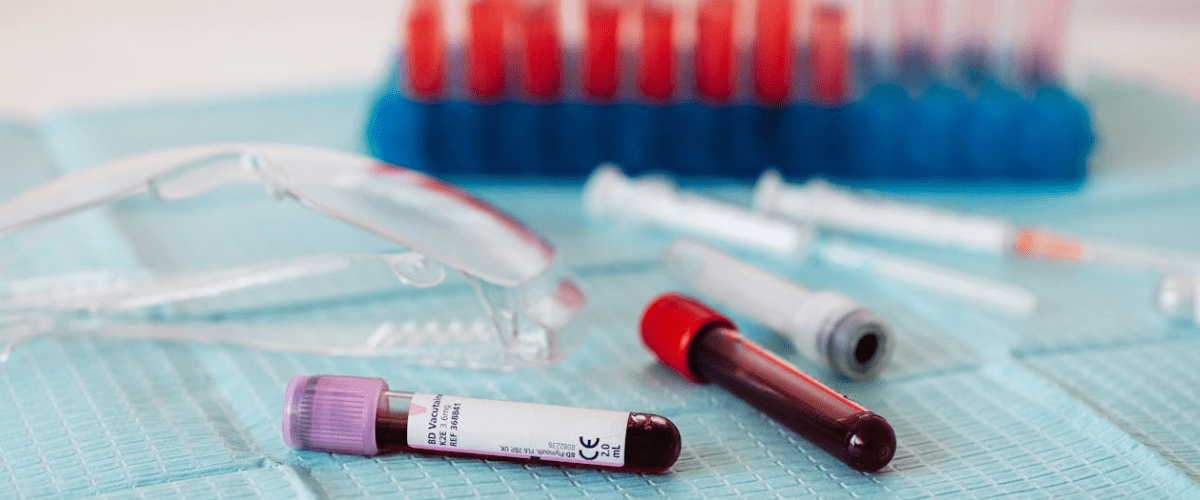
09 Apr A Complete Guide to Blood Tests & When You Need Them
A Complete Guide to Blood Tests & When You Need Them
By Island Hospital | Apr 9, 2024 3:00:00 PM
Most people understand the importance of blood tests when sick with a mysterious illness, as the tests provide important clues into what ails you.
However, blood tests can also be an excellent resource for monitoring well-being and early detection of preventable diseases.
Medical professionals often use blood tests to track the effects of proteins and chemicals in your blood, provide them with an overview of your overall health, and monitor your immune system.
In this article, you will learn how regular blood tests can empower you to take charge of your health, why you should get them, and when.
Why Blood Tests are Essential
While many blood tests are performed to determine the cause of an illness, regular testing can help you monitor your overall well-being or reveal developing conditions that respond better to treatment when detected early.
Here are more reasons why blood tests can help with health management.
1. Detailed Insights into Overall Health
A blood test can provide a comprehensive overview of your health by analyzing the various components of blood, such as cells, proteins, and chemicals.
Healthcare professionals can use this information to assess organ function, immune system strength, and overall health. Understanding these aspects can help you make more informed decisions about how to take care of yourself.
2. Early Detection
More than a few serious health conditions can go unnoticed for years before physical symptoms manifest that alert you to their presence.
In these circumstances, a blood test is a critical tool that can alert you to these conditions and allow you to receive timely treatment. Early detection and treatment of diseases like diabetes, heart disease, metabolic syndrome, and other chronic illnesses can improve health outcomes.
3. Disease Prevention
Monitoring specific biomarkers can help you identify and take steps to prevent or offset the progression of various health conditions. Blood tests are also excellent tools for assessing chronic conditions and improving disease management.
4. Optimization of Health and Well-Being
You can use the results of a blood test to improve your quality of life, as the results often provide valuable insights into mood, libido, cognitive function, and energy levels. This information can empower you to make informed decisions that can improve your overall condition.
5. Personalized Health Management
The results provided by your blood test can help you more efficiently personalize your health care, prevent diseases, and address any deficiencies in diet and exercise before they lead to imbalances.
Commonly Requested Blood Tests
Blood tests play a pivotal role in health care, but each type tells a different story as doctors use them to test for and monitor different conditions. Here are some of the most commonly requested blood tests.
1. Full Blood Count (FBC)
A FBC is a fundamental blood test that provides healthcare professionals with many clues about your health. The test will reveal information such as:
- Red blood cell count
- Hemoglobin
- Hematocrit
- White blood cell count
- Platelet count
Depending on the results, a FBC can provide clues into nutritional deficiencies, anemia, clotting problems, blood cancer, infections, and immune system disorders.
Abnormal levels serve as indicators of underlying health conditions, prompting further follow-up tests to confirm a diagnosis and recommend a course of treatment. For example, low hemoglobin levels can lead to fatigue and lack of energy, and a low white cell count makes people more susceptible to infections.
2. Liver Function, Kidney Function and Fasting Glucose
These tests are a deep dive into your health using a series of blood tests. The tests are a good indicator of the state of your liver and kidney but also yield information on blood sugar levels, your body’s acid/balance base and protein levels.
Doctors will recommend these tests when diabetes, high blood pressure, liver and kidney damage are the suspected causes of ill health. They are also an excellent test to periodically monitor these conditions and assess their progression.
3. Kidney Function
It is a blood test that will yield essential information about your health. The series of tests will check for the levels of six compounds found in your blood, including:
- Creatinine
- Urea
- Chloride
- Sodium
- Potassium
- Calcium
You may be asked to fast for at least 8 hours before giving blood, but this can vary depending on what your doctor is testing for.
When to Get a Kidney Function Test
A kidney function test will be requested when your condition is suspected to be caused by diabetes, kidney disease and electrolyte imbalances.
4. Lipid Panel (Triglycerides and Cholesterol)
A lipid panel exposes triglyceride and cholesterol levels, which are markers of heart disease. In simple terms, you should focus on ensuring HDL cholesterol, the good kind, is high and LDL, the bad kind, is low.
When to Get a Lipid Panel
Cholesterol levels are a little controversial regarding how they affect heart health. However, this test is still a great place to monitor your heart health and search for areas where you can make improvements in caring for your overall cardiac health.
5. Testing for Cardiac Biomarkers
Cardiac Biomarkers are proteins (enzymes) that can help medical professionals assess your heart function and detect potential issues. These biomarkers are critical for diagnosing heart conditions and monitoring overall cardiac health.
Here are more details about each marker and what they mean:
High Sensitive Cardiac Troponin-I (hsTnI): This enzyme can leak into the blood after a heart attack or other heart injury. The biomarker is instrumental in diagnosing acute coronary syndrome and determining the severity of the damage.
B-type Natriuretic Peptide (BNP): These substances are produced in the heart, with elevated levels indicating a risk of congestive heart failure. They also monitor heart function, providing valuable insights into the heart’s ability to pump blood effectively.
Creatine Kinase (CK) and Creatine Kinase-MB (CK-MB): This compound is primarily found in the brain, heart, and skeletal muscle. Elevated levels of CK can indicate muscle damage, such as what occurs during a heart attack. CK-MB, found explicitly in the heart, can increase in the blood after a heart attack or other heart injury, serving as a critical marker for these conditions.
6. Coagulation Panel
A coagulation panel, sometimes called a coagulation test, is a series of tests that measure the ability of blood to clot over time. These tests are essential for monitoring coagulation, which is critical to preventing blood loss after an injury.
The coagulation panel typically tests prothrombin time (PT), activated partial thromboplastin time (aPTT) and fibrinogen activity, which provide information about the blood’s clotting ability and other factors involved in the coagulation process.
When to Get a Coagulation Panel
Coagulation panels are used to diagnose a range of conditions as well as assess and monitor other health risks, including:
- Excessive Bleeding that may be indicative of conditions like hemophilia
- Thrombosis characterized by the formation of blood clots in the circulatory system that can lead to heart attack or stroke
- Liver conditions that can influence the clotting process
- Vitamin K deficiency, an essential component of blood clotting
7. C-Reactive Protein Test (hs-CRP)
CRP is a critical immune system component that fights viruses and bacteria and enhances the immune response against infection. Its levels can increase because of chronic stress, excess weight, obesity, smoking, or periodontal disease. Excessive levels of CRP can also indicate a lack of exercise and exposure to extreme emotional stress.
When to Get a CRP Test
A CRP test is a good indicator of your risk of heart disease, with higher levels increasing the risk. Minor elevations are associated with a person’s BMI and could indicate mental health conditions like insomnia or depression.
A moderate elevation could be indicative of systemic inflammation from cancer, heart attack, bronchitis, or autoimmune disease. Severe bacterial and viral infections, trauma, and systemic vasculitis can increase levels of CRP.
8. Sexually Transmitted Infections
A blood test can determine the presence of many sexually transmitted infections, including:
- Hepatitis B
- Syphilis
- Hepatitis C
- HIV
Most often, this type of blood test will be performed in conjunction with a swab of the infected tissue to improve the accuracy of the diagnosis. Unfortunately, a blood test immediately after contracting an STD is not always reliable. For example, HIV may need to be present for at least 30 days before it can be detected with this type of blood test.
9. Thyroid Panel
A thyroid panel is a battery of tests that reveal the condition of the thyroid gland and how well it responds to specific hormone treatments. The thyroid is an important gland located in the neck that regulates many bodily functions, including mood, energy levels, and metabolism.
The thyroid panel typically includes tests for the following hormones:
- Triiodothyronine (Free T3): Regulates heart rate and body temperature.
- Thyroxine (Free T4): Regulates metabolism and growth.
- Thyroid-stimulating hormone (TSH): Regulates the release of hormones by the thyroid gland.
When to Get a Thyroid Panel Test
Your doctor may request a thyroid panel when you report conditions like unexplained weight loss, mood swings, hair loss, or changes in heart rate.
If you have a known thyroid condition, such as hypothyroidism, your doctor may order regular thyroid panel tests to monitor the condition’s progression, adjust treatment as needed, and evaluate the effectiveness of the prescribed medications or interventions.
Did you know blood tests are one of the essential health screening tests for women? Read our article on health screening tests for women to learn more!
When Should You Get a Blood Test
A blood test is often the first line of detection for many conditions, so your doctor may ask for a sample in these situations:
- When you have other symptoms, the appropriate blood test can often confirm a doctor’s diagnosis indicated by your other symptoms.
- To monitor a known condition after you have already been diagnosed, your doctor will use the blood test results to track the progression of your disease or reevaluate your treatment.
- You are at high risk. If you are at an increased risk of developing a specific disease or genetically predisposed to a condition, your doctor can use specific blood tests to monitor your health.
- During an annual physical. Doctors often request a complete blood count test (FBC) to check your health.
- Before surgery, doctors often ask for blood work to check for conditions that could increase the risk during or after the surgery. For example, they might test your immune system to ensure fast recovery or check for any blood clotting issues that could cause excessive bleeding.
What Happens During a Blood Test
A blood test involves a trained healthcare worker performing a series of steps to draw your blood:
Step 1: They’ll sanitize the area where the needle enters your arm.
Step 2: Then, they’ll use a rubber band to temporarily restrict blood flow, and you may be asked to make a fist to help make veins more visible.
Step 3: Once a vein is located, they’ll insert a needle connected to a small vial, gently drawing several milliliters (mL) of blood.
Step 4: When finished, the band is removed. Typically, only 5-20 milliliters will be required, but the amount will depend on the type and quantity of tests.
Step 5: Once the blood collection is complete, the healthcare professional will remove the needle from the skin and the rubber band from your arm.
Step 6: They will then cover the drawing site with a bandage, clean cotton, and medical tape.
Step 7: Blood samples are sent to a lab for analysis.
Getting results may take hours or days, depending on the lab and number of tests. Most often, your doctor will receive the results when they will call you to make an appointment to discuss them.
Blood tests carry minimal risk but can involve slight needle pain, lightheadedness from blood loss, or accidental vein puncture.
Preparing for a Blood Test
Before undergoing a blood test, it’s essential to be aware of specific preparations that may be required to ensure accurate and reliable results. Here are some critical considerations for preparing for a blood test:
1. Fasting Requirements
Some blood tests may require fasting for 8 to 12 hours beforehand. This is because the nutrients in food and drink can temporarily affect the levels of certain substances in the blood, such as cholesterol, blood sugar, and proteins. Standard tests that may require fasting include cholesterol tests, blood sugar tests, liver function tests, kidney function tests, and basic metabolic panels.
2. Hydration
While fasting for a blood test, staying hydrated by drinking water is important. However, avoiding other beverages, such as coffee or sugary drinks, is advisable as they may affect specific test results.
3. Medication and Supplements
Inform your healthcare provider about any medications, supplements, or vitamins you are taking, as they may interfere with some blood tests. Your healthcare provider may advise you to discontinue certain medications or supplements before the test temporarily.
4. Blood-Thinning Medications
If you are taking blood-thinning medications, such as aspirin or anticoagulants, it’s crucial to inform your healthcare provider. These medications can affect the blood’s clotting ability and may require special considerations during the blood test.
5. Relaxation Techniques
Feeling jumpy or tense during blood tests? Try out relaxation practices. Take slow, deep breaths. Meditate and let your mind unwind. This could calm you down and ease any discomfort during the procedure.
Schedule an Appointment with Island Hospital
Island Hospitals offers a comprehensive range of blood tests to suit your unique health requirements.
Our Health Screening Centre is equipped with updated equipment and technology that allows for effective, accurate and fast health screening services.
If you’re searching for an all-inclusive experience, we offer two complete health packages for men and women:
Our team of healthcare professionals are ready to assist you every step of the way.
FAQ
What can be detected from a blood test?
A blood test can detect various health indicators such as cholesterol levels, blood sugar levels, liver function, kidney function, blood cell counts, and markers for specific diseases or conditions.
What blood test should I get every year?
Basic blood tests include the Complete Blood Count (CBC), Basic Metabolic Panel (BMP), and lipid panel. They provide insight into kidney function, liver function, electrolyte level, hydration status, blood cell values, and cholesterol level.
What not to do before the blood test?
Before a blood test, it’s typically recommended to avoid eating or drinking anything except water for several hours, especially if fasting blood tests are required. Additionally, certain medications or supplements may need to be temporarily discontinued before the test.
What should you avoid after a blood test?
After a blood test, it’s generally advised to avoid strenuous physical activity for a short period, keep the bandage on the puncture site for a few hours, and stay hydrated.
How painful is a blood test?
While some people may experience only mild discomfort or a brief sting during needle insertion, others may find it more painful. However, the pain is usually minimal and temporary.








